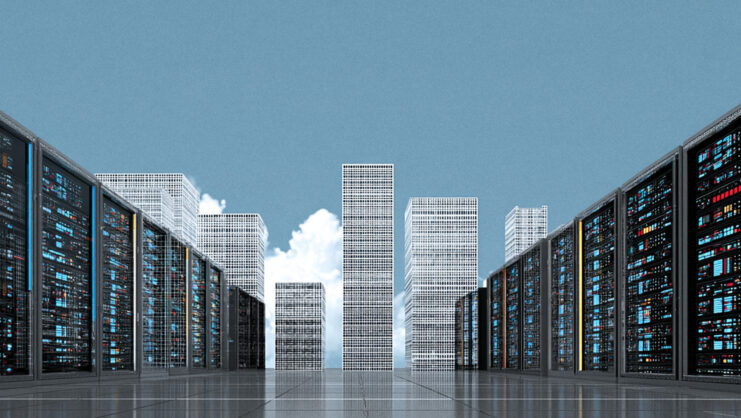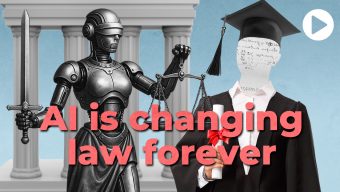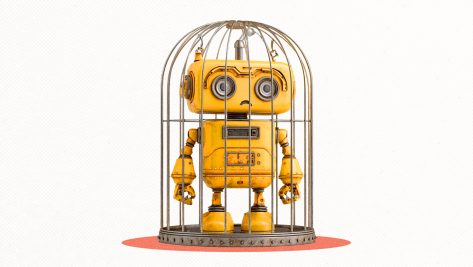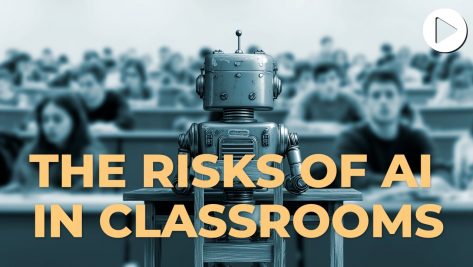Recent technological advancements related to artificial intelligence have pushed whole industries to innovate and reevaluate their established practices. Even the way we automate has changed, with robotics and AI streamlining processes and catalyzing operational efficiency and productivity, evident, for example, in the way Amazon’s fulfillment centers and Mercedes Benz factories optimize processes by seamlessly integrating robots into order fulfillment.
But technology goes beyond the paradigm of processes, affecting the entirety of business models. For example, organizations are embracing digital workflows that revolutionize operations and invigorate customer engagement. Retailing exemplifies this shift, with e-commerce titans like Alibaba and Etsy metamorphosing traditional retail spaces into digital marketplaces that allow B2B sellers and small businesses to reach customers on a global scale. Meanwhile, Amazon’s recommendation engine uses machine learning algorithms to understand customer behavior and make personalized product recommendations to customers, thereby increasing sales and customer engagement. Indeed, advancements in technology have ushered in an era where geography is no longer a constraint. Airbnb, Expedia, and similar companies transcend geographical barriers through their digital interface and connect travelers and accommodation across the world. This evolution not only expands revenue streams for homeowners but also enriches travel experiences for globetrotters.
Technology has likewise revolutionized production and distribution for companies. For example, 3D printing is breathing new life into sectors like aerospace, with companies including GE Aviation and Virgin employing the technology instead of traditional machining methods to manufacture intricate aircraft components like engine parts, turbine blades, and control consoles. This all leads to more efficiency, reduced costs, and a general improvement in overall performance metrics.
The bedrock of all this digitization is data. Businesses harness data analytics, machine learning, and predictive modeling to unearth insights that guide strategic decisions. Streaming services like. Netflix, HBO Max, and Amazon Prime all use data to deliver personalized content and enhance user experience and retention, analyze viewing behavior, and monitor engagement patterns. Netflix is a classic example of a company that was catapulted into economic growth thanks to technology. Prior to 2007, the company’s business model was DVD rental by mail. Then, once it became a streaming subscription service, Netflix continued to evolve, for example with original content production and global expansion. Technology enabled the company to transcend traditional boundaries and gain global market access. It has a very low “churn rate” at 2.4% and a high resubscription rate even after those few customers do leave. Much of this is thanks to how the company uses data and its powerful recommendation algorithm.
Cryptocurrencies represent a powerful force at the intersection of technology and economic growth. Take Coinbase, for example, a platform that effortlessly conducts digital transactions, breaking down geographical barriers and catapulting cross-border businesses to the forefront of global commerce. Then there’s PayPal and Venmo, digital payment pioneers that have completely transformed the way individuals and businesses handle financial transactions. Consider Ripple’s innovative blockchain technology and XRP cryptocurrency, designed to supercharge cross-border payments, promising lightning-fast and cost-effective international transactions. And let’s not forget Ethereum, whose blockchain platform empowers the creation of smart contracts. These smart contracts are like digital wizards that automate and streamline a wide range of agreements, from real estate transactions to optimizing supply chain management. In essence, cryptocurrencies are revolutionizing the way we do business and manage our finances in a global, interconnected world.
Technology’s transforming influence also extends to knowledge and education – and platforms like EdX and Coursera are at the forefront of this educational revolution in how they provide access to a diverse array of courses from esteemed universities to people around the world. What’s truly remarkable is how these platforms erase the traditional boundaries of education, making it accessible to anyone with an internet connection, and in many cases, for free. Imagine a student in a remote village, previously cut off from world-class education, now gaining access to cutting-edge technology courses or in-depth studies in the humanities. The impact is profound. Over the years, the adoption of such platforms has surged dramatically, with Coursera boasting more than 100 million registered learners and 7,000 courses from 250+ universities worldwide. This exponential growth isn’t just about democratizing education; it’s about cultivating a culture of lifelong learning. Professionals from all corners of the globe are seizing the opportunity to upskill and adapt to the ever-evolving landscape of industries and technologies. In essence, technology is not just changing education; it’s shaping the future of education.
Collaborative partnerships serve as incubators of innovation.
Not only has the way we learn changed, but the way we work. The surge in remote work, catalyzed by technological advancements such as high-speed internet access, cloud computing, collaboration tools such as Slack, Teams, and Zoom, VPN networks, and 5G technology, to name but a few, has and continues to fundamentally reshape workforce dynamics. Virtual teamwork has transformed the workplace by fostering efficiency and flexibility.
Of course, the rise of technology brings both innovation and challenges. The gig economy, powered by tech platforms, introduces unconventional work arrangements, reshaping employment models and company dynamics. This shift also triggers legal debates over worker classification, blurring the lines between employees and independent contractors, as seen in the ongoing battles faced by companies like Uber. In this fast-evolving landscape, technology’s impact on work is profound, raising complex questions that span borders and legal boundaries.
Regulatory frameworks and government policies are facing challenges in keeping up with the rapid pace of technological advancement. This dynamic environment is compelling governments to swiftly adapt their policies and standards. An illustrative example is the General Data Protection Regulation (GDPR) implemented by the European Union. The GDPR aims to protect user data privacy in the digital realm, aiming to find a delicate equilibrium between fostering innovation and upholding consumer rights. Another example is the United States Bill of AI Rights, recently launched to protect data privacy and prevent the hacking of sensitive information or services. These regulations serve as a beacon for other regions globally in crafting their own policies to navigate the intricate landscape of AI technology and automated systems.
As technology’s influence endures, collaboration between governments, businesses, and individuals takes on unprecedented significance. Collaborative partnerships serve as incubators of innovation. Microsoft is investing billions in a new phase of partnership with OpenAI. This extends their collaboration, allowing both to develop and sell advanced AI tech independently. Microsoft will boost supercomputing systems for OpenAI’s research and integrate their models into products. Azure will be OpenAI’s exclusive cloud provider. This partnership aims to advance AI responsibly and make it accessible to all. Since 2016, Microsoft has worked to democratize AI through Azure, resulting in top-tier supercomputing technology. OpenAI has used this to create influential AI products like GitHub Copilot, DALL-E2 and ChatGPT.
Investments in upskilling are paramount to navigate the ever-evolving technological terrain. Initiatives like Google’s “Grow with Google” and IBM’s “Free Digital Learning” provide free training, arming individuals and businesses with the competencies needed to navigate the complexities of the digital landscape.
We must wholeheartedly embrace technology’s transformative potential.
Governments shoulder the responsibility of recalibrating regulations to harmonize with technological progress. The Financial Conduct Authority (FCA) in the United Kingdom introduced a regulatory sandbox, providing a controlled environment for fintech startups to test innovative products — a testament to regulatory agility. Since its inception in 2016, the program has facilitated over 900 firms in testing their pioneering solutions, resulting in a remarkable 90% of them successfully deploying their products to market. This initiative showcases how forward-thinking regulation can foster a dynamic ecosystem, empowering fintech startups to push boundaries and revolutionize the financial industry.
As technology permeates all aspects of life, ethical considerations come to the fore, particularly the imperative of responsible technology aligned with societal values. Companies like Tesla, IBM, and Google are leading the charge in responsible AI development. Tesla, for instance, adheres to ethical AI through regulatory compliance and an internal ethics board. IBM, on the other hand, pioneers ethical AI with a framework to create transparent and fair systems, promoting diverse and inclusive data to combat biases. They collaborate with industry and academia to set AI ethics standards. Google, too, is committed to responsible AI with a set of guiding principles, prioritizing transparency, fairness, and accountability in AI systems. They invest in research and tools to address bias and actively seek external input through partnerships with AI ethics organizations. These companies are at the forefront of ensuring technology aligns with societal values.
In the midst of this technological metamorphosis, we must address the challenges of economic development and inclusion. Automation and technological change, as the 2023 World Economic Forum’s Future of Jobs Report confirms, will both create and displace jobs. To ease this transition, substantial investments in reskilling and upskilling programs are recommended. A study by the Brookings Institution underscores the importance of digital skills training to reduce disparities in access to tech-driven job opportunities. Companies investing in workforce development will better navigate this transformation and ensure seamless job transitions for employees.
Looking ahead, job growth drivers include big data analytics, climate change tech, encryption, and cybersecurity. However, some technologies like AI, digital platforms, and e-commerce may lead to labor market shifts. We must wholeheartedly embrace technology’s transformative potential – and this necessitates collaborative alliances, upskilling programs, adaptive regulations, universal access, and ethical stewardship.
In this era of boundless technological promise, we find ourselves at the nexus of innovation and inclusivity. From the seamless integration of AI in industries to the democratization of education, the impact is undeniable. Yet, with great power comes even greater responsibility. As we navigate the intricacies of this digital landscape, let us remember that collaboration, adaptability, and ethical stewardship will be our compass.
© IE Insights.











